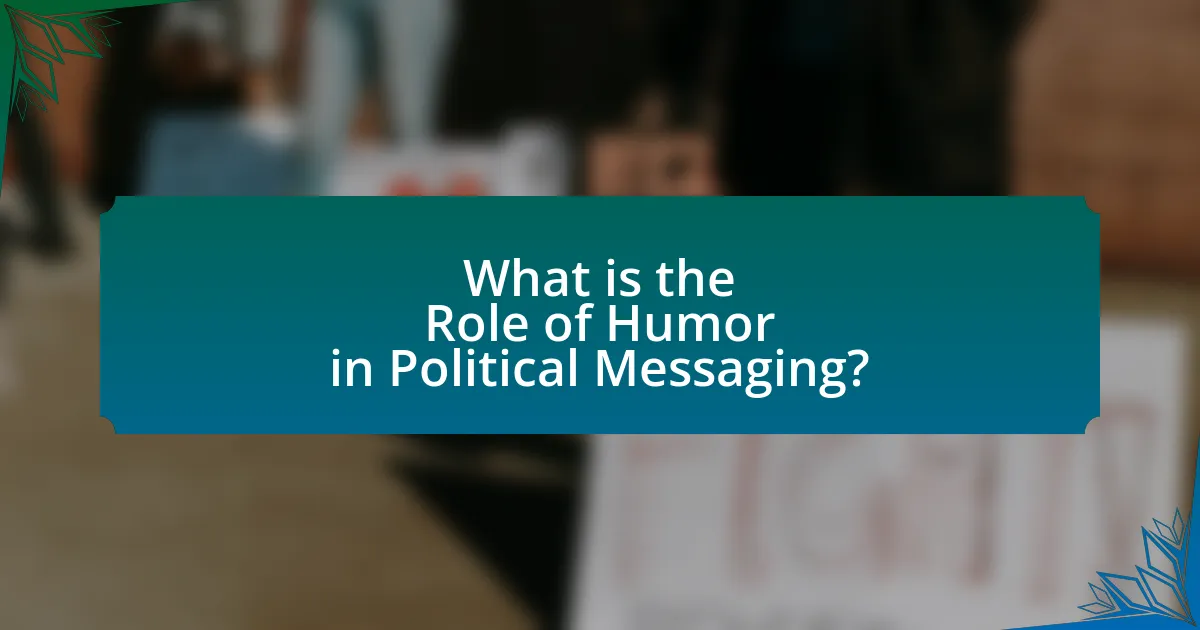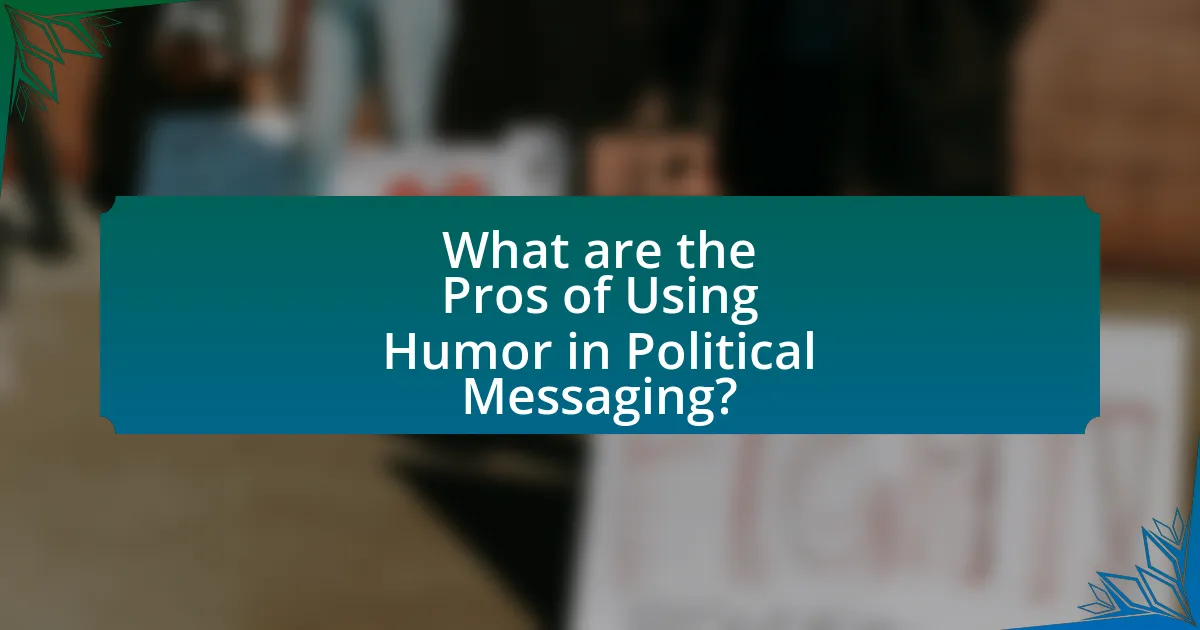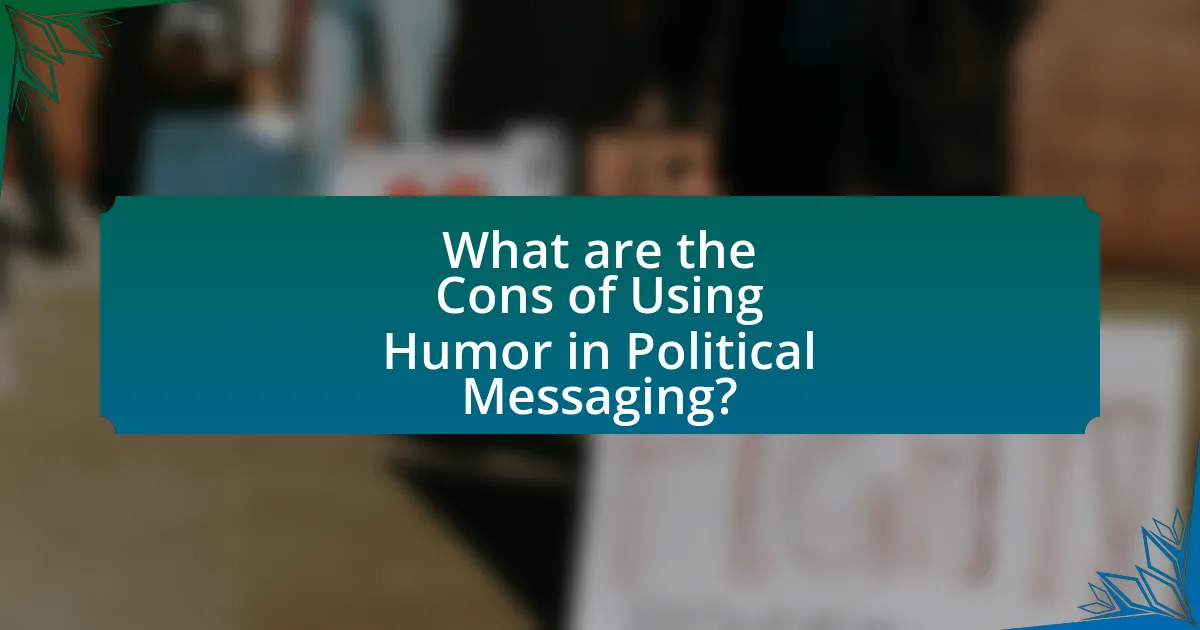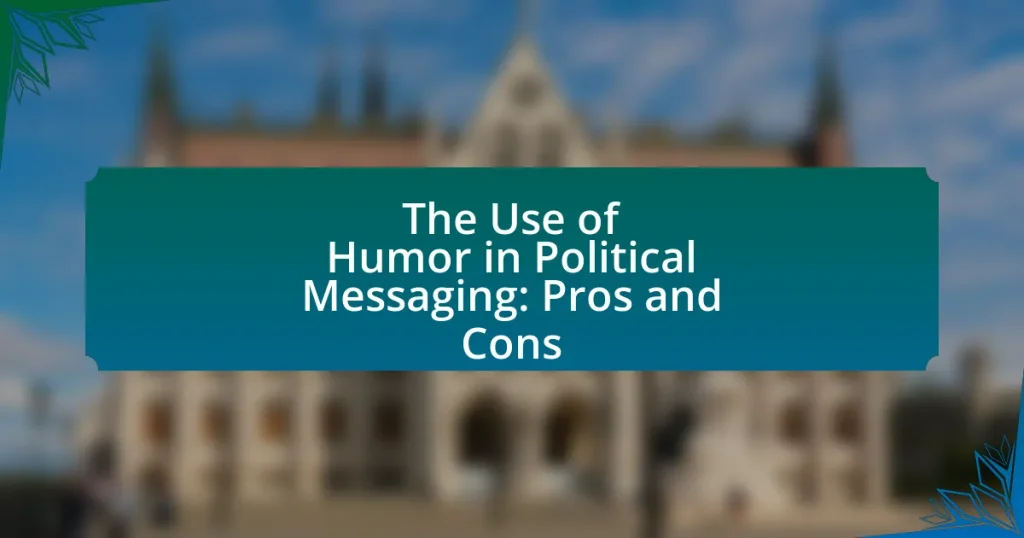The article examines the role of humor in political messaging, highlighting its advantages and disadvantages. It discusses how humor enhances engagement, simplifies complex issues, and influences public perception of political figures, while also addressing potential drawbacks such as misinterpretation and alienation of certain demographics. Key examples of humor in political campaigns, its psychological effects on audiences, and best practices for politicians using humor are also explored, providing a comprehensive overview of humor’s impact on political communication.

What is the Role of Humor in Political Messaging?
Humor plays a crucial role in political messaging by enhancing engagement and making complex issues more relatable. It serves as a tool to simplify political discourse, allowing politicians to connect with audiences on an emotional level. For instance, studies have shown that humorous content can increase message retention and encourage sharing on social media platforms, amplifying the reach of political messages. Research by the Pew Research Center indicates that humor can also reduce resistance to controversial topics, making audiences more receptive to differing viewpoints.
How has humor been historically used in political campaigns?
Humor has historically been used in political campaigns as a tool to engage voters, simplify complex issues, and create memorable messages. For instance, during the 1984 U.S. presidential campaign, Ronald Reagan effectively utilized humor in his debates, famously quipping, “I won’t exploit for political purposes my opponent’s youth and inexperience,” which helped to humanize him and connect with the electorate. Additionally, political cartoons have long served as a medium for satire, allowing candidates to critique opponents while entertaining the public, as seen in the works of Thomas Nast in the late 19th century. These examples illustrate how humor can enhance relatability and foster a positive image, making it a strategic element in political messaging.
What are some notable examples of humor in political messaging?
Notable examples of humor in political messaging include the use of satirical television shows like “Saturday Night Live,” which has featured impersonations of political figures such as Donald Trump and Barack Obama, effectively highlighting their policies and behaviors through comedy. Additionally, the “Yes We Can” music video featuring various celebrities during Barack Obama’s 2008 campaign utilized humor and catchy lyrics to engage younger voters. Another example is the “I’m Just a Bill” segment from “Schoolhouse Rock,” which humorously explained the legislative process, making it accessible and entertaining for children and adults alike. These instances demonstrate how humor can simplify complex political topics and foster engagement among diverse audiences.
How does humor influence public perception of political figures?
Humor significantly influences public perception of political figures by making them more relatable and approachable. When political figures use humor effectively, they can humanize themselves, which often leads to increased likability and trust among the electorate. For instance, a study published in the journal “Political Communication” found that humor in political messaging can enhance audience engagement and retention of information, thereby shaping favorable opinions. Additionally, humor can serve as a tool for criticism, allowing voters to perceive political figures as more transparent and accountable when they can laugh at themselves. This dual effect of humor—enhancing relatability while also providing a platform for critique—demonstrates its powerful role in shaping public perception.
Why is humor considered an effective tool in political communication?
Humor is considered an effective tool in political communication because it engages audiences, facilitates message retention, and can diffuse tension. Engaging audiences through humor captures attention and makes political messages more relatable, as evidenced by studies showing that humorous content increases viewer engagement and sharing on social media platforms. Additionally, humor enhances message retention; research indicates that people are more likely to remember information presented in a humorous context. Furthermore, humor can diffuse tension during contentious political discussions, allowing for a more open dialogue. For instance, political satirists like Jon Stewart and John Oliver have successfully used humor to address serious issues, making them more accessible to the public.
What psychological effects does humor have on audiences?
Humor has significant psychological effects on audiences, primarily by enhancing mood, fostering social connections, and facilitating cognitive processing. When humor is employed, it triggers the release of endorphins, which improve mood and create a sense of well-being. This positive emotional state can make audiences more receptive to messages, including political ones. Additionally, humor can strengthen social bonds among audience members, as shared laughter promotes a sense of community and belonging. Research indicates that humor can also aid in the retention of information; for instance, a study published in the journal “Psychological Science” found that humorous content is more likely to be remembered than non-humorous content, thereby enhancing the effectiveness of political messaging.
How can humor enhance message retention and engagement?
Humor enhances message retention and engagement by making content more relatable and memorable. When humor is incorporated into messaging, it captures attention and creates a positive emotional response, which facilitates better recall. Research indicates that humorous content can increase information retention by up to 50%, as it activates areas of the brain associated with pleasure and memory. Additionally, humor encourages sharing and discussion, further amplifying engagement. For instance, a study published in the Journal of Advertising found that humorous advertisements were more likely to be remembered and shared compared to non-humorous ones, demonstrating the effectiveness of humor in enhancing both retention and engagement in messaging.
What are the potential drawbacks of using humor in political messaging?
The potential drawbacks of using humor in political messaging include the risk of misinterpretation and alienation of certain voter demographics. Humor can be subjective, leading to varied reactions; what one group finds funny, another may find offensive or trivializing. For instance, a study by the Pew Research Center found that humor in political ads can polarize audiences, as individuals may perceive the humor as undermining serious issues. Additionally, humor may distract from the core message, causing voters to focus more on the comedic elements rather than the political content, which can dilute the intended impact of the message.
How can humor backfire in political contexts?
Humor can backfire in political contexts by alienating certain voter demographics or misrepresenting serious issues. When political humor is perceived as offensive or inappropriate, it can lead to backlash against the politician or party, diminishing their credibility. For instance, a study by the Pew Research Center found that 57% of respondents felt that jokes about political issues could be taken too far, leading to misunderstandings or reinforcing negative stereotypes. Additionally, humor that fails to resonate with the audience can result in disengagement, as seen in the 2016 U.S. presidential election when some comedic attempts by candidates were criticized for lacking authenticity.
What are the risks of misinterpretation or offense?
The risks of misinterpretation or offense in political messaging that employs humor include alienation of audiences and the potential for backlash. Humor can be subjective, leading to varying interpretations based on cultural, social, or personal contexts. For instance, a joke intended to critique a political figure may be perceived as an endorsement by some, resulting in confusion and miscommunication. Additionally, humor that touches on sensitive topics can offend certain groups, leading to public outrage or damage to a politician’s reputation. Research indicates that 70% of individuals may react negatively to humor that they find inappropriate or offensive, highlighting the delicate balance required in political messaging.

What are the Pros of Using Humor in Political Messaging?
Using humor in political messaging enhances engagement and relatability, making complex issues more accessible to the public. Humor can break down barriers, allowing politicians to connect with diverse audiences by creating a shared experience. Research indicates that humorous messages can increase retention of information; for instance, a study published in the journal “Political Psychology” found that humor can improve recall of political messages by up to 20%. Additionally, humor can diffuse tension and foster a positive image, as seen in successful campaigns where candidates used light-heartedness to counteract negative perceptions.
How does humor foster connection between politicians and voters?
Humor fosters connection between politicians and voters by creating relatability and breaking down barriers. When politicians use humor, they can humanize themselves, making them more approachable and relatable to the electorate. For instance, studies have shown that humor can enhance message retention and increase audience engagement, as seen in the use of comedic sketches on platforms like Saturday Night Live, which often influence public perception of political figures. Additionally, humor can diffuse tension during contentious political discussions, allowing voters to feel more comfortable and open to dialogue. This connection is further supported by research indicating that voters are more likely to support candidates who can make them laugh, as humor often signals confidence and authenticity.
What role does relatability play in political humor?
Relatability is crucial in political humor as it enhances audience engagement and fosters a connection between the humorist and the audience. When political humor resonates with the everyday experiences and emotions of individuals, it becomes more impactful and memorable. For instance, studies have shown that humor that reflects common societal frustrations or shared cultural references can lead to increased political awareness and participation. This is evident in the success of satirical programs like “Saturday Night Live,” which often draw on relatable political scenarios to engage viewers, thereby influencing public opinion and discourse.
How can humor humanize political candidates?
Humor can humanize political candidates by making them appear more relatable and approachable to the electorate. When candidates use humor, they can break down barriers, allowing voters to see them as individuals rather than just political figures. For example, studies have shown that candidates who effectively use humor in their campaigns tend to connect better with younger voters, as humor can resonate with their experiences and values. Additionally, humor can diffuse tension during debates or public appearances, showcasing a candidate’s ability to handle pressure and engage with the audience in a light-hearted manner. This relatability can lead to increased trust and a more favorable perception among voters, ultimately influencing their decision-making process at the polls.
What advantages does humor provide in addressing complex issues?
Humor provides several advantages in addressing complex issues, primarily by enhancing engagement and facilitating understanding. When humor is used, it captures attention and makes difficult topics more relatable, allowing audiences to process information more effectively. Research indicates that humor can reduce defensiveness, making individuals more open to new ideas and perspectives. For instance, a study published in the journal “Communication Research” found that humorous messages can increase message retention and persuasion, particularly in political contexts. This demonstrates that humor not only entertains but also serves as a powerful tool for communication, enabling deeper engagement with complex subjects.
How can humor simplify difficult political topics for the public?
Humor can simplify difficult political topics for the public by making complex issues more relatable and engaging. When humor is employed, it breaks down barriers of intimidation that often accompany political discourse, allowing individuals to approach sensitive subjects with a lighter mindset. For instance, political satire, as seen in programs like “Saturday Night Live,” effectively highlights absurdities in political situations, making them easier to digest and understand. Research indicates that humor can enhance retention of information; a study published in the journal “Communication Research” found that humorous messages are more memorable than serious ones, which supports the idea that humor can facilitate better comprehension of intricate political matters.
What impact does humor have on reducing political polarization?
Humor significantly reduces political polarization by fostering a sense of shared understanding and connection among individuals with differing viewpoints. Research indicates that humor can create a more relaxed atmosphere, allowing people to engage in discussions without the usual defensive posturing associated with political debates. For instance, a study published in the journal “Political Psychology” by researchers at the University of California found that humorous political messaging can decrease hostility and increase openness to opposing perspectives. This effect occurs because humor often highlights absurdities in extreme positions, making them more relatable and less threatening, thereby encouraging dialogue and reducing divisiveness.

What are the Cons of Using Humor in Political Messaging?
Using humor in political messaging can lead to misunderstandings and alienation of certain voter demographics. Humor may not resonate with all audiences, causing some individuals to feel excluded or offended, which can diminish support. Additionally, humor can trivialize serious issues, leading to a perception that the politician is not taking important matters seriously. For instance, a study by the Pew Research Center found that while humor can engage younger voters, it often fails to connect with older demographics who may prefer more straightforward communication. This disconnect can result in a loss of credibility and trust among constituents.
What are the limitations of humor in conveying serious messages?
Humor has significant limitations in conveying serious messages, primarily because it can dilute the gravity of the subject matter. When humor is employed, audiences may focus more on the comedic elements rather than the intended serious message, leading to misunderstandings or trivialization of important issues. For instance, a study published in the journal “Political Psychology” by researchers at the University of California found that humorous political ads often resulted in lower retention of critical information compared to straightforward messaging. Additionally, humor can alienate certain audience segments who may not share the same cultural references or sense of humor, further hindering effective communication. Thus, while humor can engage audiences, its potential to obscure serious messages presents a notable limitation in political messaging.
How can humor dilute the gravity of important political issues?
Humor can dilute the gravity of important political issues by making complex or serious topics more approachable and less intimidating for the audience. When humor is employed in political messaging, it can create a sense of relatability and ease, allowing individuals to engage with the subject matter without feeling overwhelmed. For instance, political satire, as seen in programs like “Saturday Night Live,” often simplifies intricate political situations through comedic sketches, which can lead to increased public interest and discussion. Research indicates that humor can enhance message retention and promote a more favorable perception of political figures, as evidenced by studies showing that humorous political ads tend to be more memorable and shareable among viewers.
What challenges arise when humor is culturally specific?
Culturally specific humor presents challenges such as misinterpretation and exclusion. Misinterpretation occurs when individuals from different cultural backgrounds fail to grasp the nuances or references embedded in the humor, leading to confusion or offense. For instance, a joke that relies on local idioms or historical events may not resonate with an audience unfamiliar with those contexts. Exclusion arises when humor alienates individuals who do not share the same cultural references, potentially reinforcing divisions rather than fostering unity. Research indicates that humor can enhance political messaging effectiveness, but its cultural specificity can limit its reach and impact, as evidenced by studies showing varied audience reactions to culturally tailored jokes in political campaigns.
How can humor lead to misinformation or misunderstanding?
Humor can lead to misinformation or misunderstanding by distorting facts or presenting exaggerated scenarios that misrepresent reality. When humor is used in political messaging, it often relies on satire or irony, which can confuse audiences about the actual message being conveyed. For instance, a satirical portrayal of a political figure may exaggerate their actions or beliefs to the point where the audience may take the humor literally, leading to misconceptions about their true positions. Research indicates that humor can impair critical thinking, as individuals may focus more on the entertainment value rather than the factual content, resulting in a lack of discernment regarding the accuracy of the information presented.
What are the consequences of humor that misrepresents facts?
Humor that misrepresents facts can lead to misinformation and erosion of trust in credible sources. When humor distorts reality, it can shape public perception inaccurately, influencing opinions and behaviors based on false premises. For instance, a study by the Pew Research Center found that 64% of Americans believe that fabricated news stories cause confusion about basic facts, demonstrating the impact of misleading humor on public understanding. Additionally, misrepresented humor can polarize audiences, as individuals may align with distorted narratives that reinforce their biases, further fragmenting societal discourse.
How does humor affect the credibility of political messages?
Humor can enhance the credibility of political messages by making them more relatable and engaging to the audience. When humor is effectively integrated into political communication, it can lower defenses, allowing individuals to be more receptive to the underlying message. Research indicates that humor can increase message retention and improve the perceived likability of the speaker, which in turn can enhance credibility. For instance, a study published in the journal “Political Psychology” found that humorous political ads were more likely to be remembered and positively evaluated compared to serious ones, suggesting that humor can serve as a tool for increasing the persuasive power of political messages.
What Best Practices Should Politicians Follow When Using Humor?
Politicians should ensure that humor is appropriate, relatable, and inclusive to effectively engage their audience. Appropriate humor avoids sensitive topics that could alienate or offend constituents, while relatable humor connects with the everyday experiences of the audience, fostering a sense of community. Inclusivity in humor ensures that it resonates across diverse demographics, enhancing the politician’s appeal. For instance, a study by the Pew Research Center found that humor can significantly increase engagement when it reflects the values and experiences of the audience, thereby reinforcing the politician’s message and credibility.
How can politicians ensure their humor is appropriate and effective?
Politicians can ensure their humor is appropriate and effective by understanding their audience and the context in which they are speaking. Tailoring humor to resonate with the values, beliefs, and sensitivities of the audience minimizes the risk of offending and maximizes engagement. For instance, a study by the Pew Research Center found that humor that aligns with the audience’s cultural and social norms is more likely to be well-received. Additionally, politicians should avoid humor that targets marginalized groups or sensitive topics, as this can lead to backlash and damage their reputation. By employing humor that is inclusive and relatable, politicians can enhance their message and foster a positive connection with constituents.
What strategies can be employed to balance humor with seriousness in messaging?
To balance humor with seriousness in messaging, one effective strategy is to use humor as a tool to engage the audience while ensuring that the core message remains clear and impactful. This can be achieved by incorporating light-hearted anecdotes or relatable jokes that align with the serious topic being addressed, thereby making the message more accessible without undermining its importance. For instance, political figures often use humor to diffuse tension during debates, which can enhance relatability and foster a connection with the audience while still addressing critical issues. Research indicates that humor can increase retention of information, as seen in a study published in the Journal of Communication, which found that messages delivered with humor are more memorable than those presented in a serious tone. This demonstrates that when humor is strategically integrated, it can enhance the effectiveness of serious messaging.


